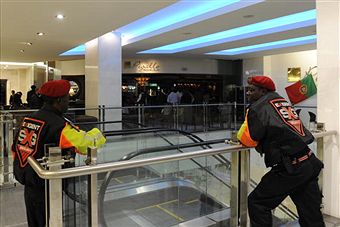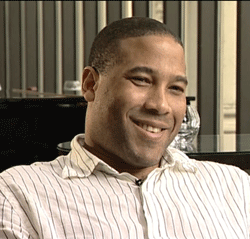The South African World Cup has proved supremely ironic. We went to South Africa wondering if the country could host the event. We have come away knowing South African can, but we are now not sure if FIFA can manage a World Cup in the modern era of technology.
Our FIFA doubts have to do with its failure to appreciate that it cannot continue to rely on the naked eye to judge all on field events. This is resulting in a yawning, dangerous gap between what happens on the field of play and what billions round on the world can see has actually happened.
The more FIFA ignores this gap the more people will see mistakes not being corrected or the guilty going unpunished, and the more they will question the fairness of the game.
In this World Cup this has meant, not only questions about the disallowed Frank Lampard goal and other referring mistakes, but more fundamental issues such as the way football enables cheats to prosper. So, for instance, the last minute of the Uruguay-Ghana match when Luis Suárez handled the ball to prevent a Ghana goal. He knew he would be sent off and Ghana given a penalty. But if Ghana missed it would be a lifeline for his team. So it proved and he celebrated.
However, as Ali Bacher, the former head of South African cricket and the man who introduced technology into the game told me: ”In rugby, that would be a penalty try – immediate five points, with the other team having a chance for conversion, which, if successful, would mean two more points. Football’s penalty award encourages offenders to commit fouls knowing they stand a good chance of getting away with it. No respectable game should allow such a thing to happen.”
Bacher knows he is asking for the moon. Given the lack of appetite to deal with technology, there is just no chance of anyone looking into the moral quagmire that the Suárez handball represents.
However, if South Africa proved the critics wrong, there were organisational problems that emerged which do need to be looked at. I can best illustrate this by describing a very personal experience.
I am writing this with my right leg in a brace and the crutches I have to use to walk leaning by the side of the table.
Normally personal aliments would not be something I would write about, but in a sense this is a story of the World Cup and South Africa.
Ten days before the final, and looking forward to a trip to Cape Town for the Brazil-Holland quarter final, followed by the semi-finals in what South Africans call the other city, I suffered a mother of an accident when I fell negotiating some steps as I was about to meet Ali Bacher.
It turned out that, in trying to stop my fall, the tendons in the quadriceps muscles of my right knee gave way and I could not put any weight on my right leg. Ali summoned a voluntary Jewish ambulance service, saying the normal Johannesburg ambulance would take hours. The voluntary one came in 20 minutes and I was taken to a private clinic where Ali himself, some years earlier, had a heart bypass operation.
The choice, said the doctor of Scottish origin, was to truss me up and send me back to back to the UK on the next plane or operate on me the following morning. You do not wish to have operations abroad, but Ali could not recommend the doctor highly enough and with my wife flying out the next day, I chose South Africa. It turned out an excellent choice. The doctor operated on me the next day and then flew off to Scotland to attend a wedding. I came out of anaesthesia in sufficient time to see Holland come back to beat Brazil and I also managed to get to the final, albeit in a wheel chair.
The result of my accident was that I suddenly had an insight into South African healthcare. It was my good fortune that the accident happened when I had such wonderful friends round me and not, say, on a street somewhere. I must say the health provision at the top compares with the best in this country. However, the standard does fall lower down the health chain. I was told by South Africans that many of the nurses and ancillary staff have left the country for more lucrative work in the Middle East and the local staff who have replaced them were not as well trained or as good.

But it must also be said that such a drop in standards would not be unknown in this country. What was significant was the high quality of the Zimbabwean nursing staff, one of whom looked after me after I left the hospital and was recuperating before flying back to the UK.
Interestingly, this drop in standards as you go down the chain was also very evident at the stadiums with the volunteers, and reemphasised when I went to the final.
Being in a wheel chair, I now had a special wheel chair pass for car park PS 10. But finding anyone who could guide us to PS 10 was even more difficult than getting England to perform. We had arrived at the stadium three hours before the kick off. We circled the stadium five times, spending an hour and a half talking to no end of volunteers. Everyone seemed to know where PS 10 was, yet all directions they gave brought us back to the same dead end with no sign of PJS 10.
In the end, on the verge of despair and on the point of deciding that we better abandon plans to see the World Cup final, my wife, who was driving, decided on a daring plan. She would stop the car in front of a police car in such a way that it could not move. She did it well and then approached the police car. There were five policemen, three squashed at the back, who looked at our car parking ticket, looked at their maps, shook their heads and in the end offered to escort my wife and me.
From then on everything fell in place. We got to a place where the police car handed us over to a senior policeman. Our car was then thoroughly security vetted: they opened the bonnet, opened the boot, and got the car up on ramp for its underside to be examined. A policeman with an Alsatian even sniffed round. Our car deemed safe, we then had a police motorbike escort to take us inside the stadium complex where PS 10 was located.
What this experience showed was that arrangements had been made and, like the health care, at the top were excellent. It was just at the lower rung not enough had been communicated to help us locate the top end easily.
I must also complement the crowd at the final. Dutch and Spanish fans mingled both before and after the game in perfect harmony. Although our seat meant a long journey for my wife pushing my wheel chair very nearly half way round the stadium, the behaviour of the crowd made the journey easier.
Even before this, the South African World Cup had reintroduced us to the idea from our youth that you could go to a football match, sit with rival supporters and not feel homicidal towards them. It was so refreshing to once again realise that we can support different teams and still coexist as human beings.
In England, over the last 30 odd years we have grown up with the idea that fans of different teams must be segregated. That the World Cup went off without any record of crowd violence, in spite of some fears this may happen when England faced Germany, shows how great this South African achievement has been.
But what about the organisational glitches of the type I experienced? Volunteers who were friendly and smiling, but not able to direct you to your seat and not having the sort of knowledge you expect from volunteers?
 Here let me quote what John Barnes (pictured), the former England player who was a television expert in South Africa, told me: “Listen, it hasn’t surprised me. Obviously, coming to Africa, the infrastructure is different to Germany, so therefore getting to the stadium and stuff like that will change.
Here let me quote what John Barnes (pictured), the former England player who was a television expert in South Africa, told me: “Listen, it hasn’t surprised me. Obviously, coming to Africa, the infrastructure is different to Germany, so therefore getting to the stadium and stuff like that will change.
“If the criteria for hosting a World Cup has to be to have the infrastructure of Britain or Germany, for example, whereby everything runs smoothly, there are going to be very few countries that can do it.
“It would only be given to countries in the West, or countries that are able to financially put such structures in place. That is wrong.
“This is the way of life in South Africa, and the fact that the World Cup was here doesn’t mean that overnight things are going to improve in terms of the public transport and roads and people being able to come here.”
But surely, I asked Barnes, should not volunteers know where things are? Barnes response was: “It was interesting, speaking to some of the FIFA delegates – they were talking about the organisational problems. They said they had seen so many lapses, not of security, because obviously there was nothing wrong on that front, but of people without accreditation getting into certain places they should not have.”
According to Barnes, a child of middle-class Jamaicans, he could see how it could happen. “If I am a black South African man, 60 years old, and a white European without accreditation approaches me and says he’s coming in here; historically and socially, because of the relationship that they’ve had, really for the last 400 years, am I strong enough to say, ‘No, you’re not coming in’?
“In this World Cup I have seen people driving into the car parks and you know they haven’t got a car pass but, because of maybe the colour of their skin, or the way that they actually are, they are allowed in. It is the kind of thing that happens in Jamaica between middle-class Jamaicans and working-class Jamaicans, in terms of one being subservient to the other. So things like that don’t really interest me because that is not that important; everything has run smoothly.”
Barnes may be a touch generous, but his overall point is right.
However, neither Barnes, nor any of us, can stop FIFA acting like an ostrich over technology. South Africa may have proved its critics thunderously wrong, but FIFA does not even want to try.
Mihir Bose is one of the world’s most astute observers on politics in sport and, particularly, football. He formerly wrote for The Sunday Times and The Daily Telegraph and until recently was the BBC’s head sports editor. His latest book, “World Cup 2010 South Africa: the Teams, the Players, the Venues”, is available now.

.jpg)